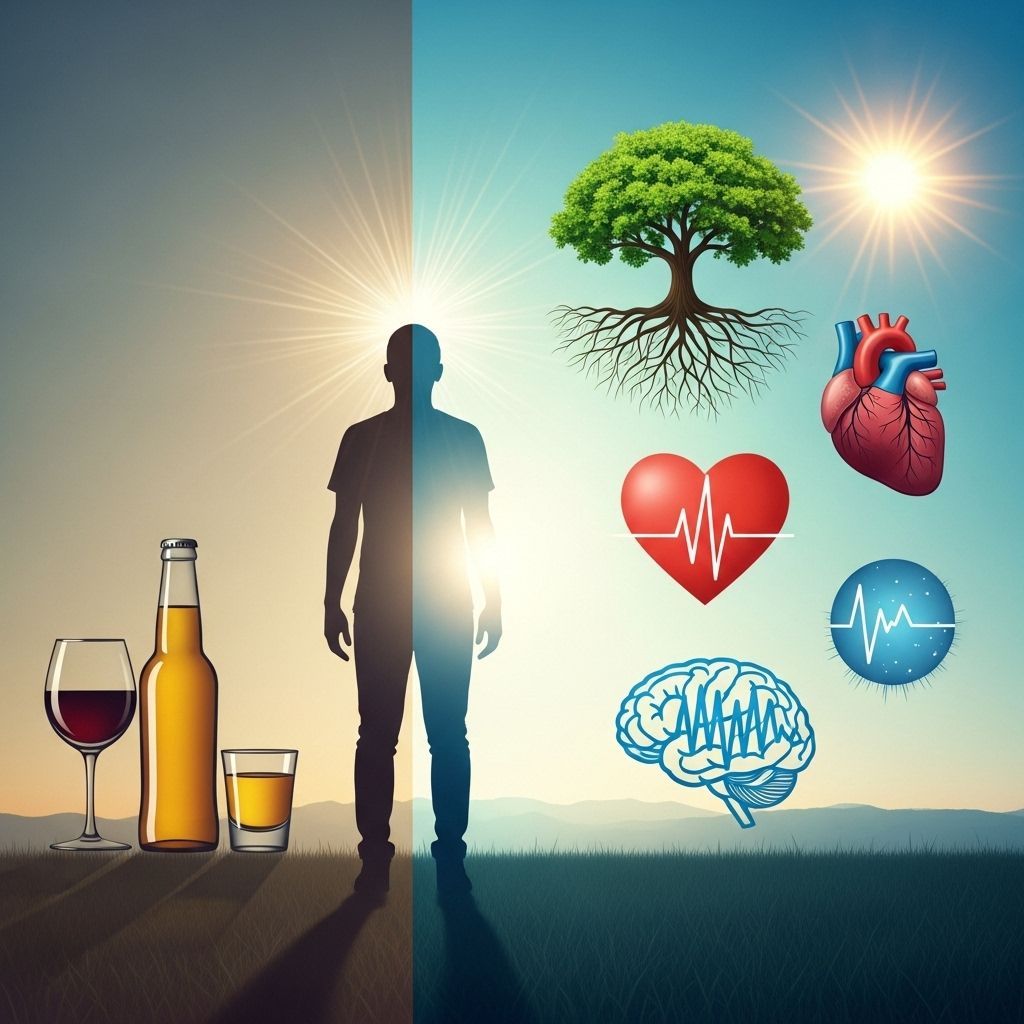Unlocking the Health Benefits of Quitting Alcohol
Transform Your Health Journey by Embracing a Life Without Alcohol

Introduction to the Health Benefits of Quitting Alcohol
Quitting alcohol can have a transformative impact on one’s health, leading to improvements in both mental and physical well-being. Whether you decide to take a temporary break or embrace a lifelong alcohol-free lifestyle, the benefits are numerous and well-documented. In this article, we will delve into the extensive health advantages of abstaining from alcohol, covering topics such as improved sleep quality, mental health, reduced disease risk, and enhanced social functioning.
Improved Sleep Quality
Alcohol may help you fall asleep faster, but it can significantly disrupt the quality of your sleep. By quitting alcohol, you can experience better sleep patterns, leading to improved rest and recovery. Studies have shown that participants in programs like Dry January reported enhanced sleep quality, reflecting a better overall sleep experience.
- Reduced Sleep Disruptions: Alcohol can disrupt the body’s natural sleep-wake cycle, leading to frequent awakenings and lighter sleep stages.
- Increased Energy: Waking up feeling more energized and refreshed is a common benefit after quitting alcohol, thanks to better quality sleep.
- Enhanced Mood: Improved sleep contributes to better mood regulation and reduced irritability.
Mental Health Benefits
Quitting alcohol can have profound effects on mental health. Alcohol can exacerbate depression and anxiety, so abstaining can lead to improved mental well-being. Research indicates that participants experience reduced depression and enhanced mental health after giving up alcohol for several months.
- Reduced Depression: Studies have shown that alcohol cessation can lead to lowered rates of depression among participants.
- Anxiety Reduction: Abstinence from alcohol can help alleviate anxiety symptoms, contributing to a more balanced mental state.
- Enhanced Self-Esteem: Quitting alcohol can boost self-esteem and confidence, especially in social settings.
Reduced Disease Risk
Alcohol consumption is linked to an increased risk of various cancers, including breast, colorectal, and liver cancers. Quitting alcohol can significantly lower this risk. Additionally, alcohol abstinence can help manage blood pressure and reduce the risk of heart complications, such as abnormal heart rhythms and dilated cardiomyopathy.
- Cancer Prevention: A reduced alcohol intake can lead to lower cancer risks, as alcohol is a carcinogen.
- Heart Health: Lowering alcohol consumption can reduce blood pressure and the risk of heart-related issues.
- Liver Health: Abstaining from alcohol allows the liver to heal and function more efficiently, reducing the risk of liver disease.
Social and Financial Benefits
Beyond the health advantages, quitting alcohol also offers social and financial benefits. You may experience fewer regrettable social moments and save significant amounts of money previously spent on alcohol.
- Financial Savings: The average person spends hundreds of dollars per month on alcohol, money that can be saved or allocated to healthier pursuits.
- Social Confidence: Quitting alcohol can lead to increased confidence in social situations, as you avoid regrettable moments often associated with excessive drinking.
- Improved Relationships: Clearer communication and better decision-making can strengthen relationships with family and friends.
Timeline of Benefits
The benefits of quitting alcohol can be observed over different time frames. Here is a brief overview of what you might experience:
| Time Frame | Benefits |
|---|---|
| After a Day | Reduced dehydration, initial liver function improvement. |
| After a Week | Improved mood and sleep quality, increased energy levels. |
| After a Month | Significant improvements in mood, reduced anxiety, better liver health. |
| After Six Months | Full recovery of liver damage in moderate drinkers, enhanced immune function. |
| After One Year or More | Reduced risk of chronic diseases such as heart disease and type 2 diabetes. |
Frequently Asked Questions
Q: What are the immediate health benefits of quitting alcohol?
Immediate benefits include reduced dehydration and improved liver function, followed by enhanced mood and sleep quality within a week.
Q: How does quitting alcohol impact mental health?
Quitting alcohol can lead to reduced symptoms of depression and anxiety, contributing to improved mental well-being and self-esteem.
Q: What financial benefits can I expect from quitting alcohol?
You can save hundreds of dollars per month that would otherwise be spent on alcohol, allowing for financial reallocation to healthier pursuits.
Conclusion
In conclusion, the health benefits of quitting alcohol are extensive and multifaceted. From improved sleep and mental health to reduced disease risk and financial savings, embracing an alcohol-free lifestyle can lead to a transformative journey of wellness and personal growth. Whether you choose temporary abstinence or a lifelong commitment, the rewards are undeniable and well worth the effort.
References
- https://www.brownhealth.org/be-well/sober-curious-and-benefits-taking-break-alcohol
- https://utswmed.org/medblog/no-alcohol-health-benefits/
- https://www.recoveryanswers.org/research-post/reducing-or-quitting-drinking-an-extensive-review-of-health-benefits/
- https://www.unsw.edu.au/newsroom/news/2025/07/day-off-drinking-alcohol-abstinence-health-benefits-stop-drinking
- https://pmc.ncbi.nlm.nih.gov/articles/PMC5397877/
- https://www.niaaa.nih.gov/health-professionals-communities/core-resource-on-alcohol/neuroscience-brain-addiction-and-recovery
- https://health.ucdavis.edu/news/headlines/dry-january-giving-up-alcohol-can-mean-better-sleep-weight-loss-and-more-energy/2023/01
- https://www.columbiapsychiatry.org/news/navigating-path-recovery-can-you-train-yourself-cut-back-alcohol
- https://www2.hse.ie/living-well/alcohol/health/improve-your-health/benefits-of-cutting-down-giving-up/
Read full bio of medha deb












